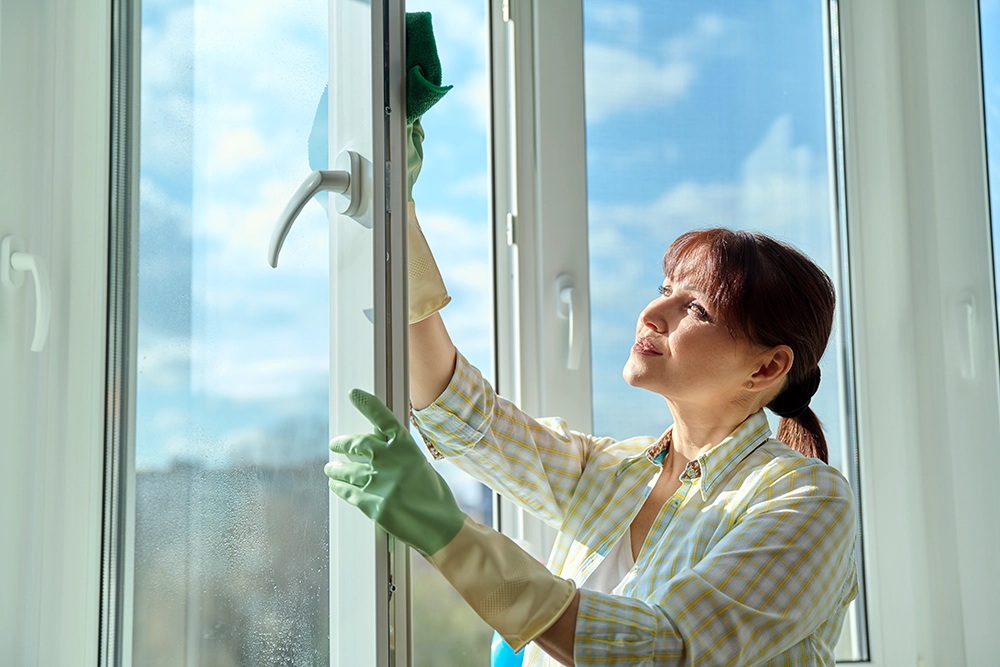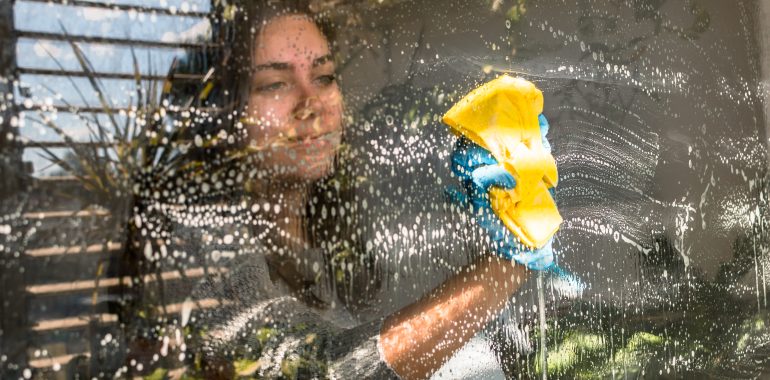Cleaning windows is an essential task that ensures the clarity and cleanliness of your home or business. However, one element that shouldn’t be overlooked is how temperature influences the effectiveness of this task. Knowing the best temperature to wash your windows is key in achieving streak-free results.
Understanding the Importance of Temperature in Window Cleaning
The optimal temperature for washing outside windows is between 50 and 75 degrees Fahrenheit. This range ensures your solution works effectively without evaporating too quickly or losing its potency in cold weather. Cleaning in extreme temperatures, whether too hot or too cold, can lead to streaks, residue, or even damage to the glass.
Cold Weather Considerations
In colder temperatures below 32 degrees Fahrenheit, cleaning windows becomes challenging because the cleaning product might freeze on the glass. A solution of water mixed with isopropyl alcohol with a 2:1 ratio (2 parts water, 1 part alcohol) is ideal for cold conditions. The alcohol helps prevent the solution from freezing, ensuring you can clean your windows even in freezing temperatures.
The temperature of your cleaning solution is also important. Hot water on cold glass can shatter the window due to sudden temperature changes. To prevent this, always use cold water, which minimizes the risk.
Hot Weather Considerations
Hot weather presents a different challenge—quick evaporation of the cleaning product when washing windows. When temperatures rise above 75 degrees Fahrenheit, the solution can evaporate too fast, leaving streaks and residue.
To counter this, clean your windows during cooler parts of the day, such as early morning or late afternoon. This way, you avoid direct sunlight, which can cause the solution to dry too quickly.
A mixture of water and a small amount of dish soap works well in hot weather, as it helps maintain a wet surface, allowing for streak-free cleaning.
Choosing the Right Cleaning Solution for Window Cleaning
Selecting the right cleaning solution is important for achieving a streak-free shine. A mixture of water and isopropyl alcohol is an excellent choice, as it evaporates quickly and reduces the likelihood of streaks forming.
Avoid Windshield Washer Fluid: While windshield washer fluid might seem convenient, it’s not ideal for cleaning windows. It often leaves streaks and residue, detracting from the clarity of the glass. Instead, consider making your own cleaning solution. A mix of water, rubbing alcohol, and a small amount of dish soap is effective and non-toxic, making it safe for both your windows and your family.
Specialized Glass Surfaces: For tinted or specialized glass surfaces, choose a cleaning solution designed to be safe for these materials. This ensures that the tint or coating remains intact while still providing a thorough clean.
Tips for Effective Window Cleaning
Using the right tools and techniques is key to achieving a streak-free shine on your windows.
Dress Appropriately: Cleaning windows can be a messy task, so it’s important to wear waterproof clothing and rubber gloves to protect yourself from chemicals and excess water.
Remove Loose Dirt First: Before applying the cleaning solution, remove and wipe off any loose dirt and debris. This prevents scratches and ensures that the solution can work effectively.
Top-to-Bottom Cleaning: Start cleaning from the top left corner of the window and work your way down and across. This method ensures that you wipe away any excess water, preventing streaks.
Using the Right Tools: A window brush with a lambskin cover is ideal for scrubbing the glass, while a squeegee is essential for removing excess water. Use long, even strokes with the squeegee, wiping the blade after each pass to avoid streaks.
Achieving a Streak-Free Shine
The goal of window cleaning is to achieve a streak-free shine that enhances the appearance of your home or business. Here are a few tips that will help you accomplish that.
Use a Squeegee: After applying the cleaning solution, use a quality squeegee to remove any remaining water.
Avoid Paper Towels: Paper towels often leave lint on the glass, ruining an otherwise perfect cleaning job. Instead, use microfiber cloths, which are designed to clean glass without leaving residue.
Choose the Right Cleaning Solution: If streaks persist, consider using a spray solution with a higher concentration of isopropyl alcohol. This evaporates quickly, reducing the chances of streaks forming.
Window Washing Temperature FAQs
Is it better to wash windows with hot or cold water?
Cold water is generally better, especially in colder weather, as it prevents glass from shattering due to temperature changes.
What time of day is best to wash windows?
Early morning or late afternoon is ideal for washing them, as the sun is not directly shining on the windows, reducing the chances of the cleaning solution evaporating too quickly.
Is it better to wash windows in the sun or shade?
Shade is preferable, as it prevents the cleaning solution from drying too quickly, which can cause streaks.
What is the best way to clean outside windows without streaking?
Using a squeegee is the best way to avoid streaks. After applying the cleaning solution to one window, use the squeegee in long, even strokes, wiping the blade after each pass.
What temperature is too cold for window cleaning?
Cleaning your windows below freezing (32°F) can cause the solution to freeze on the glass, making it difficult to clean effectively.
What’s the best way to clean a window in the winter?
Use a solution of cold water and isopropyl alcohol to clean windows in winter. This mixture prevents the solution from freezing on the glass.
Is it worth getting windows cleaned in winter?
Yes, regular window cleaning in winter prevents the build-up of dirt, grime, snow, and ice, which can damage your windows over time.
When should you not wash windows?
Avoid washing windows in freezing or extremely hot weather, as these conditions can lead to poor cleaning outcomes and possibly even damage the glass.
What is the best window cleaner for winter?
A mixture of water and isopropyl alcohol is ideal for winter, as it prevents the solution from freezing and effectively cleans the glass.
What is the ideal ratio of isopropyl alcohol to water for winter window cleaning?
A 2:1 ratio of water to isopropyl alcohol is ideal for winter window cleaning. Mix 2 parts water with 1 part isopropyl alcohol to prevent the solution from freezing while effectively cleaning your windows.
What glass cleaner won’t freeze?
Cleaners with isopropyl alcohol are less likely to freeze, making them suitable for winter window cleaning.
Can Windex freeze in the winter?
Yes, Windex can freeze in cold temperatures. A winter-specific solution with isopropyl alcohol is a better option to avoid freezing up.
How do I keep my windows clear in the winter cold?
Regular cleaning with a winter-appropriate solution and ensuring that your windows are properly sealed will help keep them clear.
For expert window cleaning services in the greater New Orleans area that cater to all seasons, contact us at Vivid Window Cleaning. We offer tailored solutions to keep your windows spotless and streak-free year-round.



